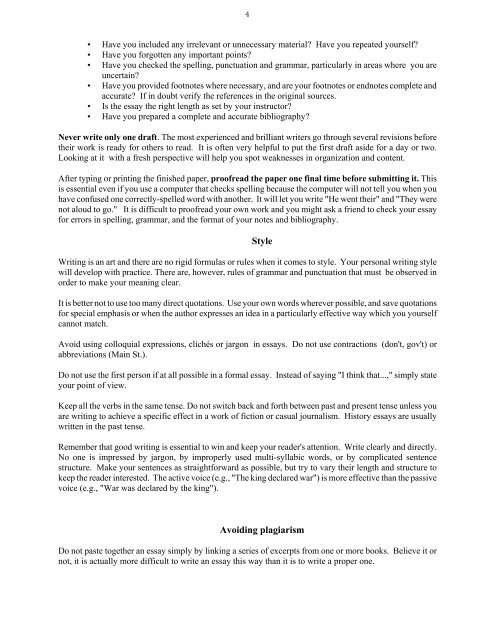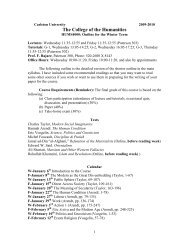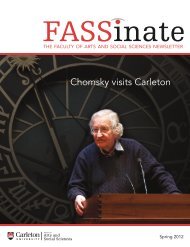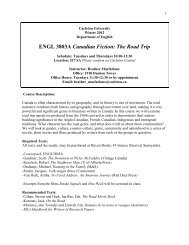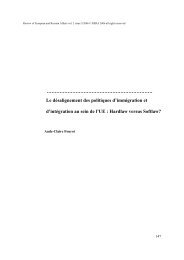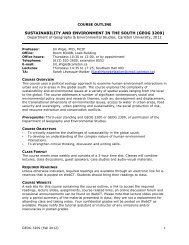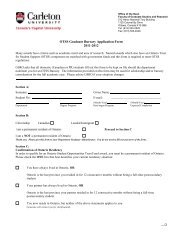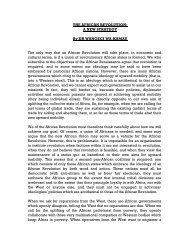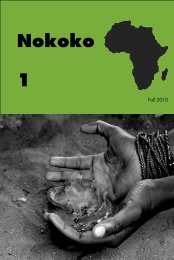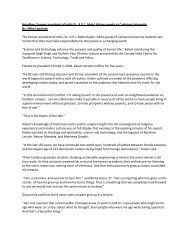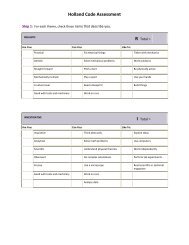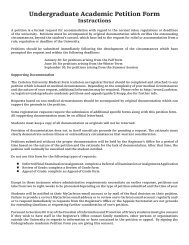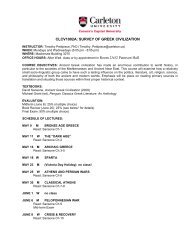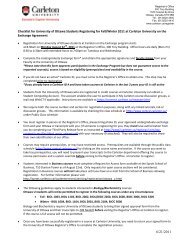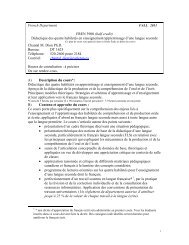Notes on writing a History essay - Carleton University
Notes on writing a History essay - Carleton University
Notes on writing a History essay - Carleton University
You also want an ePaper? Increase the reach of your titles
YUMPU automatically turns print PDFs into web optimized ePapers that Google loves.
4<br />
• Have you included any irrelevant or unnecessary material Have you repeated yourself<br />
• Have you forgotten any important points<br />
• Have you checked the spelling, punctuati<strong>on</strong> and grammar, particularly in areas where you are<br />
uncertain<br />
• Have you provided footnotes where necessary, and are your footnotes or endnotes complete and<br />
accurate If in doubt verify the references in the original sources.<br />
• Is the <strong>essay</strong> the right length as set by your instructor<br />
• Have you prepared a complete and accurate bibliography<br />
Never write <strong>on</strong>ly <strong>on</strong>e draft. The most experienced and brilliant writers go through several revisi<strong>on</strong>s before<br />
their work is ready for others to read. It is often very helpful to put the first draft aside for a day or two.<br />
Looking at it with a fresh perspective will help you spot weaknesses in organizati<strong>on</strong> and c<strong>on</strong>tent.<br />
After typing or printing the finished paper, proofread the paper <strong>on</strong>e final time before submitting it. This<br />
is essential even if you use a computer that checks spelling because the computer will not tell you when you<br />
have c<strong>on</strong>fused <strong>on</strong>e correctly-spelled word with another. It will let you write "He went their" and "They were<br />
not aloud to go." It is difficult to proofread your own work and you might ask a friend to check your <strong>essay</strong><br />
for errors in spelling, grammar, and the format of your notes and bibliography.<br />
Style<br />
Writing is an art and there are no rigid formulas or rules when it comes to style. Your pers<strong>on</strong>al <strong>writing</strong> style<br />
will develop with practice. There are, however, rules of grammar and punctuati<strong>on</strong> that must be observed in<br />
order to make your meaning clear.<br />
It is better not to use too many direct quotati<strong>on</strong>s. Use your own words wherever possible, and save quotati<strong>on</strong>s<br />
for special emphasis or when the author expresses an idea in a particularly effective way which you yourself<br />
cannot match.<br />
Avoid using colloquial expressi<strong>on</strong>s, clichés or jarg<strong>on</strong> in <strong>essay</strong>s. Do not use c<strong>on</strong>tracti<strong>on</strong>s (d<strong>on</strong>'t, gov't) or<br />
abbreviati<strong>on</strong>s (Main St.).<br />
Do not use the first pers<strong>on</strong> if at all possible in a formal <strong>essay</strong>. Instead of saying "I think that...," simply state<br />
your point of view.<br />
Keep all the verbs in the same tense. Do not switch back and forth between past and present tense unless you<br />
are <strong>writing</strong> to achieve a specific effect in a work of ficti<strong>on</strong> or casual journalism. <strong>History</strong> <strong>essay</strong>s are usually<br />
written in the past tense.<br />
Remember that good <strong>writing</strong> is essential to win and keep your reader's attenti<strong>on</strong>. Write clearly and directly.<br />
No <strong>on</strong>e is impressed by jarg<strong>on</strong>, by improperly used multi-syllabic words, or by complicated sentence<br />
structure. Make your sentences as straightforward as possible, but try to vary their length and structure to<br />
keep the reader interested. The active voice (e.g., "The king declared war") is more effective than the passive<br />
voice (e.g., "War was declared by the king").<br />
Avoiding plagiarism<br />
Do not paste together an <strong>essay</strong> simply by linking a series of excerpts from <strong>on</strong>e or more books. Believe it or<br />
not, it is actually more difficult to write an <strong>essay</strong> this way than it is to write a proper <strong>on</strong>e.


